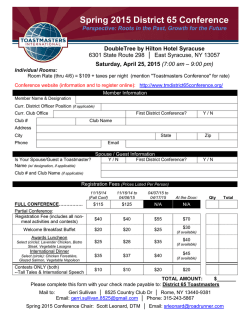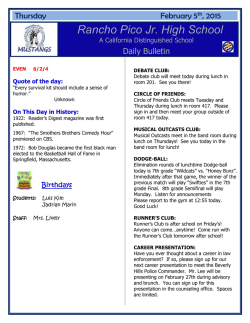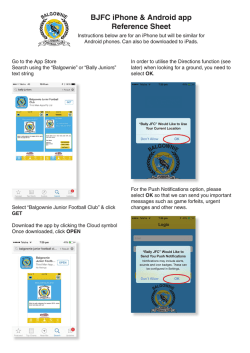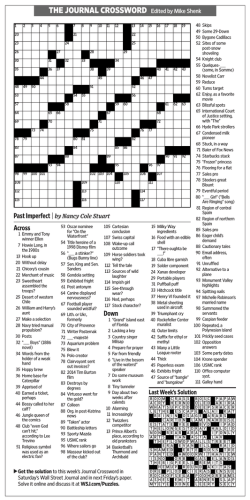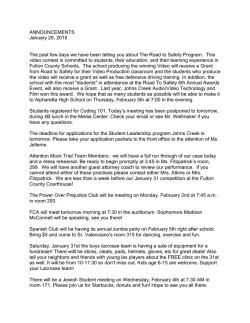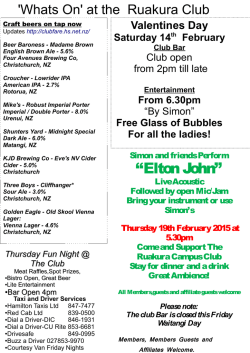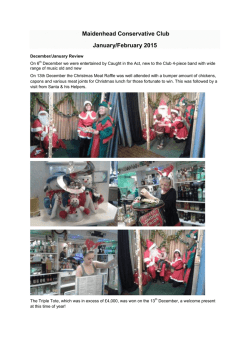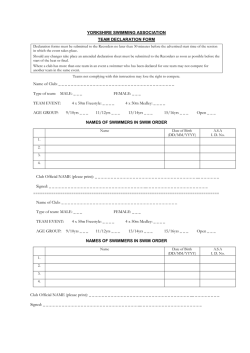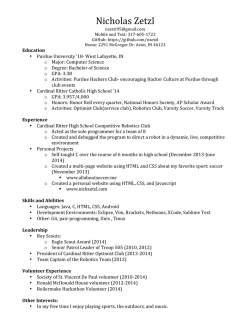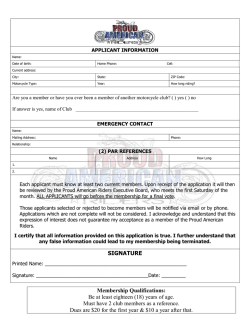
OARC e-Magazine - Ogden Amateur Radio Club
OARC e-Magazine www.OgdenArc.org FEBRUARY 2015 Next Club Meeting/Activity Meeting: Riverdale Fire Station ___________________________________________________________________________ Gil Leonard NG7IL Jason Miles KE7IET President Vice President Larry Griffin AD7GL Secretary Pete Heisig WB6WGS Mike Taylor KE7NQH Program Director Activity Director John Shupe K7DJO Treasurer Val Campbell K7HCP Webmaster/NL Editor ______________________________ PREVIOUS CLUB MEETINGS ______________________________ Meeting: APRS & Cell Phones By Jason KE7IET Riverdale Fire Station 3rd Saturday 17 January 2015 9:00 AM Presentation available on the “download” page ________________________________ NEXT CLUB MEETING/ACTIVITY Meeting: _________________________________ "Get To Know Your Fellow HAM" Bring your Show-and-Tell items! (Refreshments will be served) Riverdale Fire Station 3rd Saturday 21 February 2015 9:00 AM ______________________________ PREVIOUS MEETINGS PICS ______________________________ Photos by John K7DJO ___________________________ OARC COMING EVENTS __________________________ Utah VHF Society swap meet ... details 4th Saturday 28 February 2015 Golden Spike Special Event Station ... details Fri 08 May & Sat 09 May 2015 Utah HamFest 2015 (Ruby's Inn) ... details Friday 31 July—Sunday 02 August 2015 QRM from Gil Gil Leonard NG7IL Wow; 28 new Technicians, 2 General and 2 Extra class license privileges earned in the last testing session. Congratulations! Jason Miles, KE7IET, put in a lot of time, work and a couple of radios into the Technician license class held on the 24th of January. With the support of Rick Morrison’s, W7RIK, VE (volunteer examiner) team, it was all possible. Jason kicked off the session early Saturday morning at 8:00 am. Larry, AD7GL; Mike, KD7MG; and myself were able to assist Jason in sharing information to a roomful of hopeful new Hams. There were plenty of existing Hams there to help support the class and students, all total about 50 people. What a great turn out. Jason threw out an added incentive by offering to raffle off two radios to anyone who successfully passed their license test. That certainly woke up a couple of folks. It’s tough to go over everything in the manual in just one day but thanks to Rick supplying pizzas for lunch to speed everything up, we were able to begin testing shortly after 3:00 pm. VE funds were used to cover the cost of pizza. Rick and his team worked past 6:00 pm to get everyone through the testing. If you would like more information about the VE team or how to become a VE, please contact Rick, W7RIK, for information. morrisonri(at)msn(dot)com Two names were drawn for the radios. Jason contacted the first name drawn and informed him that he had won the mobile radio. This gentleman explained he had support and access to radios already and to please draw another name. The second name drawn was a young lady from the Eden area. Jason gave her the option to pick a radio. She was very excited to get the hand held (HT) to use when her license grant comes through. Drawing a third name, the mobile radio went to an excited gentleman from the Layton area. I am sure these two will enjoy their new radios. I hope to see these new Hams again at the next club meeting in February. All new Hams are granted a complimentary membership to the club for the remainder of the club year which ends in August. It is really great to see all these people demonstrate one of the underlying qualities that all Hams share; the willingness to help, teach and support other people interested in this great hobby. The majority of the people in the class indicated that they were interested in emergency communications. These new Hams should fit right in. A reminder of events coming up: 4 February @ 6:00pm. Regular VE testing open to everyone. Sheriff training room on 12th street in Ogden. See the club website for maps and details. 21 February @9:00am. Ogden radio club meeting at the Riverdale Fire Station located on Parker Drive in Riverdale. See the club website for maps and details. 8th and 9th of May. OARC special event station W7G. Golden Spike National Monument celebration of the driving of the golden spike at Promontory Utah. This is a fun event. Come out and join us. We will have control operators standing by so you can try your hand on the HF bands regardless of your license class. It will make a great family day too. You need to see the trains up close, they are awe inspiring. See the club website for maps and details. Plan your calendars so you can join us. Thank you to all the Hams who support the Technician class and the club. You are what make this club truly great. 73 de Gil NG7IL CLUB NEWS Welcome to the following OARC “New-Comers” that visited our club meeting recently. We welcome you back soon! New comers—Visitors Welcome Lamont Camp KG7IGQ Kevin Flanagan KB7MAD Lonnie Sutton N0INC Jimmie Boyd Lauralee Gardner Welcome —New Members & Renewals Dave Mamanakis KG7PYF Patti Sawyer KG7PMI Karl Lloyd KF7WLR CLUB NEWS Congratulations to the follow new and/or upgraded Hams from the latest Licensing Class and VE Test Session. UPGRADES Mamanakis, David Mecham, Keith Black, Jesse Cottrell, Gerald KG7PYF KD7OLB KD7UVD KG7IGW Extra Extra General General KG7QNO KG7QNN KG7QNK KG7QOD KG7QNU KG7QNZ KG7QNQ KG7QNT KG7QOK KG7QOA KG7QNX KG7QOI KG7QNV KG7QNW KG7QNS KG7QOL KG7QNL KG7QNP KG7QNY KG7QOE KG7QOB KG7QOJ KG7QOC KG7QOH KG7QOF KG7QNR KG7QNM KG7QOG Tech Tech Tech Tech Tech Tech Tech Tech Tech Tech Tech Tech Tech Tech Tech Tech Tech Tech Tech Tech Tech Tech Tech Tech Tech Tech Tech Tech NEW HAMS Bailey, Ellen Bailey, Scott Browning, Randy Dowell, Elizabeth Green, William Jr Guess, Eddie Hansen, Spencer Howes, Richard Jensen, Allen Johnson, Peter Jones, Donald Jones, Joshua Mecham, Dallin Menzies, Richard Mueller, Joseph Murphy, Colleen Murphy, Derek Nelson, Craig Norton, Thomas Provenzano, Robert Riley, John Jr Shaw, William Shedard, Johnnie Stevenson,David Swenson, Craig Terrell, Martha Terrell, Richard Workman, Michael CLUB NEWS (sk) Darwin Salisbury, K6IGU. Darwin passed away on 26 December 2014 @ 93 years of age. He attended the OARC Christmas Family Dinner on Saturday the 20th of December where he renewed his membership for another year. Less than a week later he died. You just never know, do ya! 73 Darwin. March 22, 1921 ~ December 26, 2014 Our loving father, grandfather, and great-grandfather, Darwin LeRoy Salisbury, 93, passed away at his home, on Friday, December 26, 2014. He was born March 22, 1921 in Logan, Utah to LeRoy Gibbs and Gwennie Blanchard Salisbury. He grew up on a ranch and rode his horse to school in Cache Junction from 1927 to 1933. He attended Newton school for 7th and 8th grade and graduated from North Cache High in 1939. He attended Utah State University for three years majoring in Radio Technology. From 1942 to 1944 he was called to teach Sailors and Marines radio/electronics at Utah State Naval Radio Training School. The Navy had enough technicians trained and was closing the school; he was then released and enlisted in the Navy for Radar Training. He received training in Great Lakes, Chicago, IL, Monterey, Treasure Island San Francisco, CA, MIT Airborne Early Warning Radar School, and Boston, MA. He then served in Cambridge at MIT Radiation Research Laboratory development of AEW for B17 installation. He was then sent to the Naval Radio Transmitter Base Barrigada, Guam. He was honorably discharged in 1946. He married Lorna Grix, daughter of Arthur W. and Violet Hall Grix of Ogden in the Logan LDS Temple on December 20, 1946. They both graduated from USU in 1947. They lived in Logan, Vernal, Provo and Ogden where he worked for radio broadcast stations as an engineer/announcer. He worked for HAFB and DDO from 1950 - 1953, then moved to Long Beach, CA to work for Douglas Aircraft. From 1956 until he retired in 1987 he worked for TRW Space Electronic Systems Division in Redondo Beach. They lived in Rancho Palos Verdes, CA from 1960 to 1988. During this time they were called to an LDS Mission serving the Asian Refugees in Long Beach. They also served a faithful mission in London, England from 1988 to 1989. Upon their return they made their home in Ogden where they served two Intercity Church Service Missions, and serving as Temple Ordinance workers together for six years. He continued to serve on his own as a Temple Ordinance worker after Lornas health no longer allowed her to accompany him. Darwin adored his dear wife and family. He held a strong testimony of the Lord Jesus Christ and His sacrifice for all mankind. He knew that The Church of Jesus Christ of Latter-day Saints was truly the work of the Lord led by the prophets he had chosen. He served in a number of church callings; including Ward Mission Leader, High Priest Leader, Bishops Counselor, Stake and Ward Sunday School Presidencies, Scout Master, Priesthood and Sunday School Teacher, Priesthood Organist, Stake Clerk, High Counselor, Assistant Ward Clerk, Stake Radio Emergency Response Communication Specialist, and as a Ward Family History Specialist. He was very active in his community and served as county and state delegate for elections for many years. He was president of Eastgrove Condominium Homeowners Association for five years. He served as a jurist for the Los Angeles Superior Court and county courts on several occasions. He is survived by his daughters; Susan (James) Shepherd of Roy and Nancy Mangan of Omaha, NE; eight grandchildren; 24 great-grandchildren; sisters, Mildred Jones, Julia (Vaughan) Rigby; sisters-in-law, Peggy Salisbury and Marge Salisbury. He was preceded in death by his wife, Lorna; daughter, Darla Layer; four brothers, Ivan, Lyman, George, and Grant Salisbury; brother-in-law, Edwin B. Jones; and sister-in-law, Margaret Peggy Salisbury. Funeral services will be held at 11 a.m. on Saturday, January 3, 2015 at the Canyon Hollows Ward, 1550 Rushton Street, Ogden. A viewing will be held on Friday, January 2nd from 6 to 8 p.m. at Myers Ogden Mortuary, 845 Washington Blvd and prior to services from 9:45 to 10:45 a.m. at the church. Interment will be at the Logan Cemetery where military honors will be accorded. In lieu of flowers, the family asks that donations be made to the LDS Missionary fund or charity of choice. CLUB NEWS Kent Stettler KD7BDJ (SK) Thu 1/22/2015 His obituary is in the Standard Examiner today. He was the owner of the Nut and Bolt Bin. Kent came out to club meetings when he got his license a number of years ago. I got to know him there. I would see him about once a year when I went to the nut and bolt bin to get something. Mike, KZ7O __________________________________________ Thu 1/22/2015 Gary Liptrots N7ZI mothers obituary in the paper today. Those of you who do not know Gary, he was the club president in 2004-2005 and remained on the board as an advisor for an additional 2 years after that. Mike, KZ7O CLUB NEWS Club Badges of yesteryear I was going through my ham stuff and found this OARC membership ID card from 1983. Thought you would like to see it. Stan: Looks like you were really involved with this card! I think that Larry Tucker's call sign was N7EZC. Rick Hansen N7EGA _______________________________________________ CLUB NEWS Club Badges John K7DJO our club treasurer is worried about several of you that have not picked up your new pre-paid OARC club badge. Your badge doesn’t look quite like this one because it has your call sign and your name on it but we are quite sure you will enjoy yours just the same. You can claim your badge at any future club function, meeting, activity or event or contact our club badge czar John K7DJO. _______________________________________________ KE7VVT, John KF7HNU, Ralph KG7FMY, Ryan KG7IGQ, Lamont KG7IHA, Tom KG7KFD Tony KG7LIG, Andrea CLUB NEWS DID YOU KNOW THAT … (or do you really care?) To date there are 84 paid up OARC Members To date there are 114 OARC Yahoo Group Members The OARC website has about 1000 visits per month The OARC website is hosted by GoDaddy.com The club owns 2 domain names: OgdenARC.org and W7G.org Website has about 25 web pages in addition to the home page There are about 125 html files that make up the website The download page contains downloadable contributions from our club members Have you read the ARCS6 (Top of Utah 6 meter group of the 60's) article by John Shupe K7DJO on the “download” page? You might want to! Do you have anything to contribute to the clubs “download” page. Don’t be bashful. CLUB GAMES GET TO KNOW YOUR FELLOW HAM This month: Test your knowledge of “OARC related items of interest”. How to play: Go to the OARC website home page and click the link OARC Monthly “Cross Word Puzzle” from the right side panel. Then print the .PDF file. ____________________ Club Swapmeet ____________________ “SALE” or “WANTED” ITEMS NEEDED OARC’s O-bay (On-Line Swap-Meet) items needed for the web site... Visit http://www.ogdenarc.org/ then click on Obay-Swap. _______________ ____________ Featured Item _______________ CLUB REPEATER NEWS Scott Willis KD7EKO Mike Fullmer KZ7O Scott Willis KD7EKO and Mike Fullmer KZ7O are the OARC repeater engineers that keep our club repeaters at Mt Ogden and Little Mountain operational. More to come ... following the next 3 pages of commercials. Please stay tuned. OARC YAHOO GROUP Did you know that OARC has a Yahoo Group? We occasionally communicate with our OARC members via the Yahoo Group. Receive notices regarding upcoming club meetings and future e-newsletter release notices and much more like CHAT items of interest. You can also send/receive notices to/from other group members yourself. It’s easy to sign up… Just click on the icon at the top of the club website home page and then follow the Yahoo Group instructions to create yourself a user ID and password. Club Badges OARC Club badges are available for all licensed club members. The cost is $10.00 each. The badge comes with a “MAGNETIC” clip. Badge includes your Call Sign in large letters and your First Name in a somewhat smaller font in white lettering on a pitch black background with the club logo. See example below. Place your order along with $10.00 in advance for each badge ordered and specify Call Sign and First Name. Contact webmaster or any club officer via email or contact the club treasurer at the next club meeting. For additional information see club website left side menu and click “Join” to fill out a club application form to order a club badge. OARC MEMBERSHIP DRIVE SUPPORT YOUR RADIO CLUB Don’t forget to signup/renew your OARC membership now ($15) which runs August to August. Consider signing up your spouse as well. Ham + Spouse = $15 + $10 = $25 THANK YOU FOR YOUR SUPPORT Join OARC Renew your membership now! Membership in the Ogden Amateur Radio Club is open to anyone interested in Amateur Radio. You do not need an amateur license to join us. You do not need to join the club to participate with us. Dues are used to operate the club, field day activities, and repeater equipment maintenance. Joining is easy. Come to a club meeting or fill out an application form from the club website (click “Join” from the left side main menu). Instructions for mailing on the form. DUES: Dues are $15.00 per person and runs August - August. (Ham + spouse = $25.) More than one ham in the family? Consider the OARC Family plan for $25. NOTE: New Hams >>> Membership in OARC is complimentary for remainder of 1st year licensed. HOBBY NEWS An old friend and working associate of mine at IBM Corp sent this to me. I’d like to share it with you all. Thanks Val K7HCP When I had a Serious Noise Interference problem in my neighborhood in South Jordan Utah (a Single Phase to Three Phase unshielded Digital Converter for a backyard lawn water feature display). The Digital noise was interfering all the way up to 10 MHZ and was totally wiping out AM radio reception as well. I tried to work with the neighbor to resolve this problem but when the neighbor told me that she was going to call the Police and complain that I was harassing her, I was left no choice but to call the FCC. Riley Hollingsworth answered the phone first ring, and took charge. It took 6 months to resolve but it was eventually resolved. I met Riley in Boise where I live now and he remembered the lady and said she was sure “hard headed”. Anyway I came across this website with the guy who likes to talk where Riley gave a speech at his old radio club, a 13 minutes video. Enjoy! http://arvideonews.com/hrn/HRN_Episode_0174.html https://www.youtube.com/watch?v=oCN-3jkMHqE#t=432 73, Mike K7CF HOBBY NEWS From the Utah VHF Society president—Mel Parkes NM7P Thanks to all Utah VHF Society members! As your president I would like to take a moment to express my appreciation to all those who are members of the Society. We have experienced many issues this year that have required us to spend a great deal of funds to assist with a number of repeater site repairs, upgrades, and to build new sites. Without your support none of this would have been possible, thanks for your dues and continued membership. In addition we appreciate your membership as we have grown to the point now where we have become the largest Amateur Radio Organization in the State of Utah. Thanks again and please continue to invite and encourage your fellow hams to become part of the Utah VHF Society. HOBBY NEWS Attention all Amateur Radio Clubs in Utah The 2015 ARRL Rocky Mountain Division Convention --- Utah Hamfest is scheduled for: July 31, August 1 and August 2, 2015 at Ruby’s Inn, Bryce Canyon City Would like all the Utah ARCs to make announcements on their nets, in their meetings and/or on their web pages. For more information go to the web page www.utahhamfest.com and view the promo. Hamfest reservation will be available on line soon. Make your reservations at Ruby's Inn early to get the Hamfest Discount use the reservation code 31G. Follow the "Where to Stay" link. or Contact Ruby's Inn directly at 1-866-866-6616 http:// www.rubysinn.com/ Best Regards Bob Anderson Utah Hamfest Publicity PS: I just attempted to make reservations at Ruby Inn on line but… I had to call the 866 number and do it over the phone. Be sure to give the reservation code 31G because all the rooms are blocked out to all others. 73, Val Campbell K7HCP FCC “Paperless” Amateur Radio License Policy Goes into Effect on February 17 01/28/2015 [UPDATED 2015-01-29 1939 UTC] Starting February 17, the FCC no longer will routinely issue paper license documents to Amateur Radio applicants and licensees. The Commission has maintained for some time now that the official Amateur Radio license authorization is the electronic record that exists in its Universal Licensing System (ULS), although the FCC has continued to print and mail hard copy licenses. In mid-December the FCC adopted final procedures to provide access to official electronic authorizations, as proposed in WT Docket 14161 as part of its “process reform” initiatives. Under the new procedures, licensees will access their current official authorization (“Active” status only) via the ULS License Manager. The FCC will continue to provide paper license documents to all licensees who notify the Commission that they prefer to receive one. Licensees also will be able to print out an official authorization — as well as an unofficial “reference copy” — from the ULS License Manager. “We find this electronic process will improve efficiency by simplifying access to official authorizations in ULS, shortening the time period between grant of an application and access to the official authorization, and reducing regulatory costs,” the FCC Wireless Telecommunications Bureau (WTB) said. According to the WTB, the new procedures will save at least $304,000 a year, including the cost of staff resources. Are these cool or what? NEW FOR the FALL of 2014 is the introduction of the ZN-9CRB. This iambic paddle features a classic round base design on a 7/8" thick x 3" diameter brass base. It is unique in that it is available in either 3/8" or 5/8" OTO. All the other Iambic paddles (exept for the ZN-MiniMite) have the option of 5/16", 1/2", 3/4" and 1" OTO - see OTO options for more details. These are fixed parallel arm arrangements. Measure your favorite key's OTO and order accordingly. The fingerpieces are available in red, blue, or black carbon fiber. The ZN -SL, ZN-SLH, ZN-SLjr and ZN-SLR represent the single lever paddles. The ZN-HK is the new straight key using 4 ball bearings and solid silver contact points. NEW FOR 2015 is the ZN-HKR, all brass round base straight key. HOBBY NEWS Submitted by Kent WA7AHY A Binary Way to Tune I happened upon the following article of the ARRL Website just before Christmas. A transmission from SAQ at the World Heritage Grimeton site in Sweden, using the vintage 200 kW Alexanderson alternator on 17.2 kHz will take place on Christmas Eve, December 24 2014. The message transmission will begin at 0800 UTC (transmitter tune-up will get under way at 0730 UTC). I did have a Tremetrics Model 900A VLF/LF receiver that would tune 17.2 kHz. I figured out that the UTC times were just after midnight MST so had to lose a little sleep to monitor for the signals. I thought it might be of interest to some on how the tuner worked. The receiver has a row of 8 single-pole-single throw toggle switches. The frequency of interest was 17.2 kHz. We want to toggle the switches to the value that will indicate 172. Flipping the toggle to the UP position will add that value. 128 64 32 16 8 4 2 1 U D U D U U D D 8 4 128 32 Indicated Frequency Value 172 If we add 128+64 the value would be 192 which is too high. If we didn’t use 128 then 64+32+16+8+4+2+1=127 gives too low a value. So if we leave 128 in then add 32+16 it would be too much again (176) So we try 128+32+8+4=172 it will be right on. The overall frequency range of the receiver is 9.9-25.6 kHz in the Very Low Frequency band and 59.9-75.6 kHz in the Low Frequency band. These are in 100 Hz steps. While I recorded from 0730 UTC which was the beginning of testing and then from 0800 UTC when the CW transmissions began it was almost impossible to view the ARGO trace on the replay. Even transferring to a Radio Sky-pipe spectrum recording program did not present I captured these pictures off the laptop screen by my cell phone camera. The photo above constitutes what was being received by ARGO. The only thing that looked like intelligence (below) is show by the 10 second, what I can call a “modulation envelope.” The vertical lines are shown at 10 second intervals. The “envelope” on the top line started just before 14.1800 Hrs. and ended 10 seconds later just before 14.1810 Hrs UTC. This was 14 hours after the transmitting started. I had let it run all night and into the day and just happened to get a picture of the display when I went out to the shack to stop the recording. Any thoughts or guesses what the “envelope” could be are welcome. Remember this was at 17.2 KHz. I used ARGO software mainly used for decoding very slow speed Continuous Wave (CW) using frequencies below the Broadcast Band. One can use ARGO’s waterfall display coming from the top of the screen or switch to the full-band view so that the display starts at the right side and moves left. This is the method I used. The default display mode was set at QRSS 3. TNX Kent, WA7AHY GUEST ARTICLE by KB6NU With Just a WSPR It's really amazing what you can do with computers in amateur radio, and there's been an explosion in the number of digital modes. One interesting mode that I've recently been introduced to is WSPR, which is short for Weak Signal Propagation Reporting. The protocol and the original WSPR program was written by Joe Taylor, K1JT, and is designed for sending and receiving low-power transmissions on the HF bands to test propagation paths. I won't try to cover all the technical details here. There are several sites that cover them pretty well: * Wikipedia: WSPR (http://en.wikipedia.org/wiki/WSPR_% 28amateur_radio_software%29) * G4ILO's Shack: WSPT - Distant Whispers (http://www.g4ilo.com/wspr.html) I was introduced to WSPR by my friend, Joe, AC8ES. He posted a message to our club mailing list asking if anyone had a toroid core that he could buy to make a QRP balun for 10 MHz. When I asked what he was going to use it for, he said that he was making a WSPR transmitter with a Raspberry Pi, and the balun was for the dipole he built for it. He said that he'd gotten roped into doing this because he'd attended a local Raspberry Pi users' group, and when he mentioned he was an amateur radio operator, they encouraged him to try this project. How could I refuse a request like that? I have a whole kit of ferrite cores, and after some back and forth, we found a small core that he could use. The software he chose is WsprryPi (https://github.com/JamesP6000/WsprryPi). It's described a "Raspberry Pi transmitter using NTP-based frequency calibration." It uses a GPIO port to generate WSPR signals anywhere from 0 to 250 MHz. Joe said that there are several Raspberry Pi programs that run WSPR, but that he chose this one because it seemed to have more features than the others. Figure 1 shows Joe's setup. Since the output generates a square wave, a low-pass filter is needed to filter out the high-frequency components. As you can see, the GPIO output is fed through a 0.1uF decoupling capacitor into a Mini-Circuits 10.7MHz low-pass filter, then to a 1:1 balun, which is connected directly to the dipole elements. Joe says, "The antenna is just a dipole taped up to the walls of my living room and hallway." As you can see he made the balun and dipole from 24 ga speaker wire. The performance of this setup has been kind of amazing. In one e-mail, Joe reported, "Your toroid seems to be working well. Got the balun and antenna finished and executed seven WSPR transmissions from the Raspberry Pi. The WSPR reporting website WSPRnet (http:// wsprnet.org) came back with a couple dozen reception reports; typical distance is ~300+ miles, max was 593 miles." In a second e-mail, Joe writes, "Did a few more beacon transmissions and checked the WSPR signal reports again. Someone picked up my 5 mW signal from 1010 miles away in Canada." Joe's turned into quite a WSPR fan. He's even written an Android app - WSPRnet Viewer (https://play.google.com/store/apps/ details?id=com.glandorf1.joe.wsprnetviewer.app) to retrieve and displays report from www.wsprnet.org. Tapping on a specific report displays more details about it, along with a world map that shows transmitter and receiver locations. Unfortunately, I don't have a Raspberry Pi, or I'd try this as well. I do have a BeageBone Black, but there doesn't seem to be software that I can download and install as easily as the Raspberry Pi software. That being the case, this might be a good excuse to purchase one of those new, cheaper RPis. NOTE: YOU CAN DOWNLOAD THE PHOTO FOR FIGURE 1 FROM http://www.kb6nu.com/wp -content/uploads/2015/01/IMG_3708-RPi_WSPR_low.png. -------------------------------------------------------------------When he's not digging through his junk box or teaching amateur radio classes, KB6NU writes about amateur radio at KB6NU.Com. He has just released The CW Geek's Guide to Having Fun with Morse Code. The book is available on Amazon.Com or on KB6NU.Com. FEATURE ARTICLE The Battery Powered Mobile Station (Part 2) by K2CTC (Chris) Welcome to part two of “The Battery Powered Mobile Station.” If you have not had a chance to read the first part, it was published within the January 2015 edition of the Watts News OARC e-Magazine, which is available in the newsletter archive of the OARC web site or by following this link: http://ogdenarc.org/newsletter_archive/Watts%20News%20January% 202015.pdf In the first part we examined the operating environment and electrical requirements of a typical mobile station. We established a power requirement of 12V DC (13.8V nominally) and an ampere rating based on the highest possible current draw (generally when operating at full/ high TX power) from the radio with some added wiggle room. For the purpose of this article I am going with a 20A requirement, which is representative of a “typical” VHF/UHF mobile rig with an advertised TX output power of approximately 50W or less. We established that a radio will consume a substantially higher amount of electricity while transmitting than while receiving, a fact which weighs heavily on our amp-hour or “time” requirement. That is, how long do you expect to operate your station on battery power between charge cycles? In this second part, I am going to focus on the battery. We will cover a few common types of lead-acid batteries and get into a bit more detail on amp-hour ratings. I will touch on creating “new” batteries by connecting individual batteries together in series and in parallel. Finally, we will take a look at charging systems. There are many different rechargeable battery chemistries available on the market. I’m sure you are familiar with at least a few… Nickel Cadmium (NiCd), Nickel-Metal Hydride (Ni-MH), Lithium-ion (Li-ion), Lithium Polymer (LiPo), and the list goes on. Each has its own strengths and weaknesses, applications best suited for its use, and maintenance considerations. While any of the afore mentioned battery types can be configured to power our mobile station, the lead-acid battery has certain characteristics that make it the preferred choice. There are three primary kinds of lead-acid batteries. The traditional flooded type “wet” cell battery, and the more modern AGM (absorbed glass mat) and “gelled” types (both commonly referred to as “dry” cell batteries). The former is relatively demanding when it comes to proper operation/handling and maintenance considerations. Whereas the latter two are typically labelled as “maintenance free” or “sealed”. Both AGM and gel types are also commonly referred to as VRLA (valve-regulated lead-acid) batteries. WARNING: While it can be said that all batteries are hazardous, lead acid batteries possess the risk of explosion due to buildup of hydrogen and oxygen gas as a result of excessive charging. Take note that flooded battery types should not be used without proper ventilation. Although the VRLA battery types recombine these gasses back into the battery as part of their design, therefore minimizing the ventilation requirement, malfunction is always a possibility. Additionally, it should be noted that a compromised case of a flooded battery will result in leakage of the electrolyte solution and cause property damage and/or bodily harm. The risk of spilled electrolyte is greatly reduced and/or eliminated with the other battery types, hence the term “dry” cell. Of the three primary kinds of lead-acid batteries, the AGM type is the preferred choice for our application. They are safer and easier to use and maintain than the “wet” types. They are less expensive and can generally deliver more current than the “gelled” types. They are “maintenance free” and will not spill when cracked/damaged, and they can generally be used without concern for ventilation. I spoke about the “time” requirement for our station in part one. This is where the amp-hour rating of the battery comes into play. I promised a more detailed explanation of this rating, so here it goes… First off, there are usually multiple amp-hour ratings for a single battery. They are based on the time it takes to go from a charged to a discharged state. The typical rating is based on a discharge over a 20 hour span of time. But the rating could be based on 24 hours, or 10 hours, etc. These additional ratings are usually not printed on the battery. The overall ability (capacity) of the battery to deliver energy varies based on how quickly the energy is consumed. This is known as Peukert’s law. Stated otherwise, a current of 5 amps over 20 hours (5A*20H=100AH) is NOT the same as 10 amps over 10 hours (10A*10H=100AH). Additionally, one must contend with discharge and recovery efficiency. That is to say, how well can the battery recover from a fully discharged state? Or, how “deep” a discharge can it reasonably handle without effecting overall health? You may have heard the term “deep cycle” when referring to lead-acid batteries. This refers to the ability of the battery to handle a “deep” discharge per charge “cycle" on a regular basis. So how deep of a discharge are we talking about here on a “deep cycle” battery? Well, the numbers will vary depending on the battery and who you talk to, but I think 50% is a widely accepted value (and it makes for easy math). Now, a 100AH battery has suddenly become a 50AH battery, with the remaining 50AH effectively unusable without causing potential damage. Do you follow? This is why I say the amp-hour rating can be deceiving to the uninformed. I personally aim to only consume 20% of the overall capacity per charge cycle with the hope of extending the life of the battery. Just remember, the more often you deeply discharge your battery, the shorter its life will be. Aside from amp-hour ratings, batteries will often have maximum charge/discharge ratings in amperes. This information is not always readily available but can prove important depending on usage. Let’s stick with a 100AH battery as an example with the typical 20 hour rating. We have established that this means the battery can handle 5 amps continuously for 20 hours before being depleted. But what is the highest current (amps) it can supply without damage? Stated otherwise, a current of 5 amps over 20 hours (5A*20H=100AH) is NOT the same as 100 amps over 1 hour (100A*1H=100AH) or even 200 amps over 30 minutes (200A*.5H=100AH). The reason I bring this up goes back to our initial power requirement of 20 amps (not to be confused with amp-hours). So, our chosen battery should be able to safely/reliably deliver 20 amps of continuous electrical current to our radio while we TX at full power. It is worth adding, by connecting multiple batteries in parallel you increase the total number of amp-hours and by connecting multiple batteries in series you increase their voltage. In short, two 6V batteries in series equals one 12V battery with an amp-hour rating equivalent to only one of the two connected batteries. Two 12V batteries connected in parallel will result in one 12V battery with a total amp-hour rating of the combined total between the two. So if you had two 100AH 12V batteries connected in parallel, the result would be one big 200AH 12V battery. There is a short (3m30s) video on YouTube that explains/demonstrates this in a concise manner: “How to Wire 12V Batteries in Series and Parallel” - http://youtu.be/Sqmm2JgsO48 (NOTE: If you look closely during the video you will see that these batteries have the 20 hour rating printed on them.) So, when selecting a battery, first make sure that the maximum discharge rate is adequate to supply your station at full TX power. Then, determine how many amp-hours you need and add at least 50% to that number. I have a 125AH battery with a maximum charge/discharge rate of 30A which is more than adequate to power my rig, even at full TX output. I can safely consume roughly 62.5AH between charge cycles. I find this to me more than adequate for my needs. Chargers are usually rated by the maximum (or constant) amperage that they put out (and into the battery). Charging a battery too rapidly should be of equal concern as overcharging a battery. When selecting/configuring your charger, make sure that you are not exceeding the maximum charge rate (in amperes) of your battery. I highly recommend a “smart” charger that has some intelligence built-in to prevent overcharging. I personally use a Battery Tender brand trickle charger and have been satisfied with it. Smart chargers have an algorithm that will modify the charging characteristics (volts and amps) based on the state of the battery. While in theory, a smart trickle charger can remain permanently connected. I have discovered anomalies in charging after the battery has been subject to heavy loads. Perhaps this only applies to my charger. But since the Battery Tender brand is popular, I will share with you my work-around… Initially my system was charged via solar panel and a solar charge controller. Current circumstances limit my ability to place the solar panels on our home so I am left with the AC trickle charger as a backup measure. With a solar system, you expect one charge cycle per twenty-four hour period, beginning when the sun rises and ending when the sun sets. During the non-daylight hours the battery does not receive a charge. I have recently replicated this by using a heavy-duty timer switch in-line with my trickle charger setting my charger to cycle between on/off every 12 hours. Since I have switched from leaving the charger running 24/7 to this new method cycling the power every 12 hours, I have noticed an increase in overall system performance. Batteries have a self-discharge rate as well. This is the rate at which they will naturally loose a charge while idle. It is important to run a battery through a charge/discharge cycle every now and then (I would say at lease once a month) to prevent the battery from discharging itself to a point where damage occurs. This is true of all rechargeable battery types. Well, I think that about covers it. In summary, one must first determine their power requirements (voltage, amperage, and amp-hours (duration of use)) so an informed decision can be made regarding battery selection. My personal recommendation is a single 12V AGM deep cycle type battery with enough capacity to meet your operational goals. Always use the correct gauge wire when making connections to the battery to accommodate the maximum current you anticipate flowing through. Also, I have found Anderson Powerpole connectors to be a fantastic addition to all of my 12V applications. Yes, the crimping tool and connectors are expensive, but well worth it in my opinion. If you have questions/comments, please feel free to send them my way at k2ctc (at) arrl (dot) net. Or strike up a conversation in the OARC Yahoo! group. Until next time, 73! -K2CTC ANNOUNCEMENTS Next Club Meeting: Next Weber Co VE Test Session: 3rd Saturday of each Month 1st Wednesday Feb, Jun & Oct The Ogden Amateur Radio Club meetings are usually held on the 3rd Saturday of each month. Exam sessions are held in Ogden every few months, usually the first Wednesday in February, June, and October. Meeting/Activity: Time: 06:00 PM Walk-ins allowed See notices above Location: Permanent location Talk-in: -146.82 (pl 123.0) Weber County Sheriff Office Training Room 712 W 12th Street Ogden Utah Check OARC web site for details www.ogdenarc.org Please invite a friend to join you. You do not have to be a member of the club to participate in our club meetings or activities. We invite all to join us. If anyone is interested in doing a presentation on something or just have something unique to show at the meetings. - Please get a hold of any of the officers and let us know. Contact: VE Liaison: Rick Morrison W7RIK (Liaison) [email protected] (801-791-9364) Jason Miles KE7IET (IT) Cost: $ 14.00 Two forms of ID, one of which must be a picture ID. For "Upgrades" bring current license and a copy of current license, and any CSCE's Most calculators allowed. Calculator memories must be cleared before use. Club Web Site OTHER AREA REPEATERS FREQ Be sure to visit our club web site. www.OgdenARC.org Club membership is open to anyone interested in Amateur Radio. You do not need an amateur license to join us. Dues are used to operate the club, field day activities, and repeater equipment maintenance. Club Call Sign Listen to the club repeaters for this very familiar CW ID. You do know Morse Code don’t you? W7SU ARRL Field Day is held on the last full weekend of June every year. Location may vary each year so watch this notice for details as time draws near. See you there. OARC REPEATERS FREQ CLUB TONE LOCATION 146.900- OARC 123.0 Mt Ogden 448.600- OARC 123.0 Mt Ogden 146.820- OARC 123.0 “Talk-in” 448.575- OARC Little Mtn CLUB TON E LOCATION 146.620- UARC none Farnsworth Pk 147.120+ UARC 100.0 Farnsworth Pk 449.100- UARC 146.2 Farnsworth Pk 449.500- UARC 100.0 Farnsworth Pk 147.040+ DCARC 123.0 Antelope Isl 447.200- DCARC 127.3 Antelope Isl 449.925- DCARC 100.0 No Salt Lake 145.290- GSARC 123.0 Brigham City 145.430- GSARC 123.0 Brigham City 147.220+ GSARC 123.0 Brigham City 448.300- GSARC 123.0 Brigham City 146.640- BARC none Logan 146.720- BARC 103.5 Mt Logan 147.260+ BARC 103.5 Promontory Pt 449.625- BARC 103.5 Mt Logan 145.250- WSU 123.0 * coming soon 449.250- WSU 123.0 * coming soon 145.490- K7HEN 123.0 Promontory Pt 146.920- N7TOP 123.0 Promontory Pt 449.775- N7TOP 123.0 Promontory Pt 147.100+ Morgan 123.0 Morgan Co 448.825- IRLP/Echo 123.0 Clearfield City 449.950- IRLP 123.0 Clearfield City 449.425- IRLP 100.0 Nelson Peak 147.360+ Summit Co 100.0 Lewis Peak (w/auto patch) 100.0 Little Mtn (w/auto patch) AREA CLUB MEETINGS & WEB SITES CLUB WEB SITE DATE/TIME LOCATION OgdenARC ogdenarc.org 3rd Saturday 09:00 am Check OARC web site … WC ARES ogdenarc.org/ 2nd Thursday 06:30 pm Weber Co. Library join.html#ares Ogden Utah 1st Saturday 10:00 am WC Sheriff West 12th Street Ogden Utah Comm-O Barc Weber Co. Sheriff Complex barconline.org 2nd Saturday 10:00 am Cache Co. Sheriffs Complex 200 North 1400 West Logan Ut CSERG dcarc.net Last Wednesday 8:30pm /ares.htm/ DCarc dcarc.net Clearfield City Hall Clearfield Utah 2nd Saturday 10:00 am Davis Co. Sheriff Complex Farmington Utah NU Ares Uarc home.comcast.net/ ~noutares/ 3rd Wednesday 7:00 pm xmission.com 1st Thursday 7:30 pm Cache Co. Sheriff Office Logan Utah UofU EMC Bldg Room 101 Salt Lake City Utah /~uarc/ GSarc Ubetarc.org Check Website Check Website Utah DX udxa.org 3rd Wednesday check web page for details check web page for details Salt Lake City area ussc.com Each Tuesday 8:00 pm Weekly 2 meter net /~uvhfs/ (refer to web site) (no eye ball meetings) WDArc westdesertarc.org/ 1st Tuesday 7:00 pm Tooele County Courthouse Tooele Utah WsuArc https:groups.googl e.com/forum/#! forum/wsuarc 3rd Thursday 5:30 pm WSU Blding #4 Room ? Association UvhfS Ogden Utah LOCAL AREA NETS DATE CLUB FREQ Daily @ 12:30 PM mt Utah Beehive net HF 7.272 Mhz HF LSB Daily @ 07:30 PM mt Utah Code net HF 3.570 Mhz HF CW Daily @ 02:00 UTC Utah Farm net HF 3.937 Mhz HF LSB Sunday @ 8:45 AM Ogden Old Timers HF net 7.193 Mhz HF LSB Sunday @ 7:30 PM GS ARC 145.430 - 123.0 (training net) Sunday @ 8:30 PM SATERN Net 145.900 - 123.0 Sunday @ 9:00 PM Morgan Co Net 147.100 +123.0 Sunday @ 9:00 PM UARC Info net 146.620- no PL tone required Monday @ 9:00 PM 2-meter SSB net 144.250 Mhz 2-meter USB Tuesday @ 8:00 PM Weber ARES 448.600 - 123.0 Tuesday @ 8:00 PM VHF Society Swap 147.120 + 100.0 Tuesday @ 9:00 PM Bridgerland ARC 147.260 + 103.5 Wednesday @ 8:00 PM GS ARC 145.290-, 145.430-, 448.300- (all 123.0) Wednesday @ 8:30 PM CSERG 145.770 simplex Wednesday @ 9:00 PM No. Utah 10m HF net 28.313 Mhz HF USB Wednesday @ 9:00 PM 6-meter SSB net 50.125 Mhz 6-meter USB Thursday @ 6:30 PM Davis Co Elmers Net 147.040 + 123.0 New Hams Thursday @ 8:00 PM Weber State ARC 146.820 - 123.0 (coming soon) Thursday @ 8:00PM State RACES VHF/IRLP 145.490 - 123.0, 146.680 - 123.0 Thursday @ 8:30 PM Davis ARES 3rd Thursday - even months only 147.420 = simplex Thursday @ 9:00PM Wasatch Back Net 147.360 + 100.0 Saturday @ 8:00AM mst RACES State HF 3.920 Mhz HF LSB QCWA net HF 3rd Saturday – odd months only 7.272 Mhz HF LSB Saturday @ 11:00AM mst OARC OFFICERS OTHER CLUB APPOINTMENTS President: Gil Leonard NG7IL VE Liaison: Richard Morrison W7RIK Jason Miles KE7IET (IT) Vice Pres: Jason Miles KE7IET Repeater Engineers: Mike Fullmer KZ7O Secretary: Larry Griffin AD7GL Scott Willis KD7EKO Treasurer: John Shupe K7DJO Photographer: John Shupe K7DJO Program Director: QSL Manager: John Shupe K7DJO Pete Heisig WB6WGS Historian/Librarian: Kent Gardner WA7AHY Activity Director: Mike Taylor KE7NQH Equipment Manager: Val Campbell K7HCP “WATTS NEWS” e-Magazine Club Call Sign Trustee: Larry Griffin AD7GL NL Editor: Val Campbell K7HCP Advisors: “OARC” web site Stan Sjol W0KP Mike Fullmer KZ7O Kent Gardner WA7AHY Webmaster: Val Campbell K7HCP Kim Owen KO7U Larry Griffin AD7GL 73 es cul de W7SU www.OgdenArc.org
© Copyright 2026
